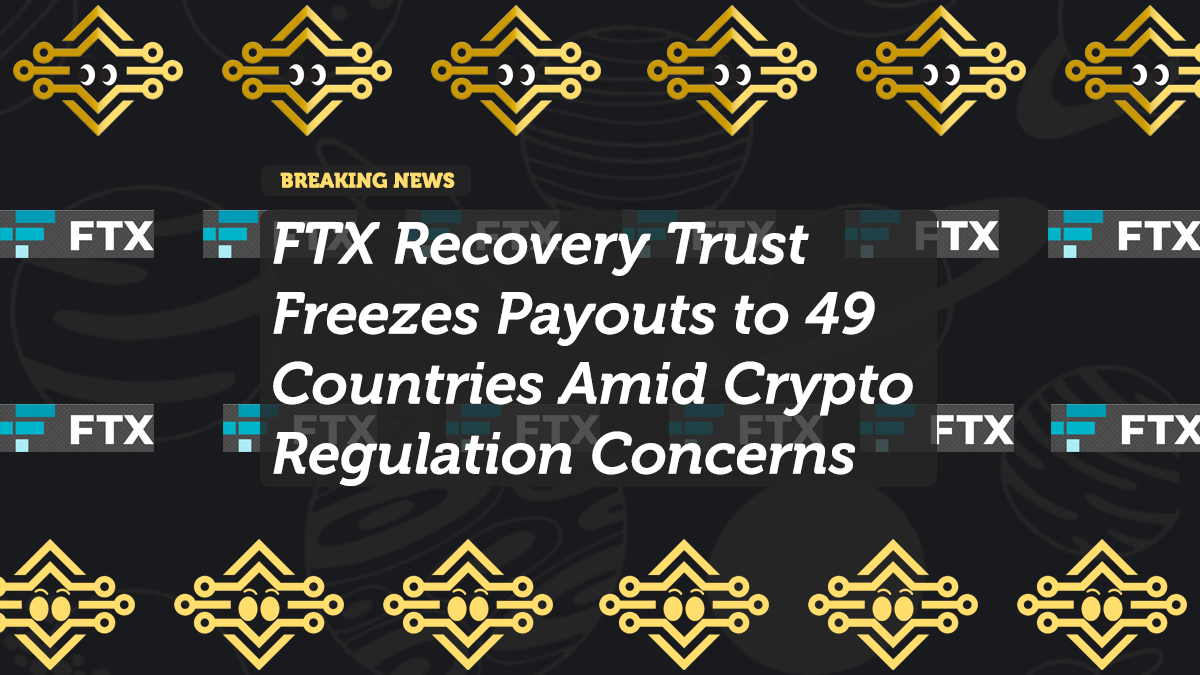
FTX Recovery Trust Freezes Payouts to 49 Countries Amid Crypto Regulation Concerns
As part of its restructuring and creditor repayment plan, the FTX estate filed a motion with the U.S. Bankruptcy Court for the District of Delaware requesting permission to freeze payouts in so-called “restricted jurisdictions.” These are countries with either unclear or outright restrictive regulations around digital assets.
According to the filing, the estate is acting cautiously to avoid criminal penalties, fines, or personal liability that could arise from sending crypto payments to countries with legal barriers.
What Is a Restricted Jurisdiction?
The motion outlines a list of 49 countries considered problematic due to existing or potential legal consequences around crypto distributions.
This list includes:
- China
- Russia
- Iran
- Saudi Arabia
- Egypt
- Ukraine
- Macau
- And many others
Each of these countries either prohibits or heavily regulates crypto-related activities, including the receipt of digital assets.
Why the Freeze Matters
FTX is not banning payouts to creditors in these countries outright.
Instead, the estate is asking the court to pause the distribution of funds to users in those regions until the legal framework is clarified. The FTX Recovery Trust will hold the funds until it can confirm that transferring digital assets will not violate local laws or U.S. regulations.
This move comes as part of the estate’s broader attempt to act within global legal limits while ensuring maximum recovery for creditors.
What Triggered the Concern?
One of the key motivators was the lack of legal clarity in many regions where creditors reside. For example:
- In Macau, both financial institutions and payment providers are explicitly prohibited from offering crypto services.
- In China, all forms of crypto trading and possession are outlawed.
- Other countries are flagged for ambiguous enforcement, lack of licensing, or severe penalties.
The estate fears that executing a crypto transfer in such jurisdictions could backfire, potentially triggering international legal battles or even criminal charges.
FTX’s Position: Clarity First, Payout Later
The estate’s legal team emphasized that they are not permanently denying claims from users in these countries. Instead, they are requesting time to:
- Review legal frameworks in each region
- Consult international legal counsel
- Establish a process for compliant payouts
This strategy reflects a cautious approach aimed at protecting directors, officers, and the estate itself from potential fallout.
What This Means for Creditors in Restricted Regions
If you’re a creditor of FTX residing in one of the listed 49 countries, here’s what you need to know:
- Your funds are not gone.
- Your claim is still valid.
- Payouts are simply on hold pending further legal analysis.
- The estate may resume payouts later, depending on local regulatory interpretations.
What Comes Next?
The court will now decide whether to approve the estate’s motion. If granted, the FTX Recovery Trust will proceed with normal payouts in compliant jurisdictions and freeze transactions to restricted regions.
Meanwhile, the trust is expected to:
- Provide updates to affected creditors.
- Engage with legal experts to review each country’s stance on crypto.
- Reassess frozen distributions once clarity is achieved.
FAQs
Q: Will creditors in restricted countries lose their money?
No. The funds are simply being held temporarily until the estate can ensure payouts are legal and safe.
Q: When will affected creditors receive their payments?
There’s no specific timeline. It depends on legal developments and whether the estate can confirm compliance in each jurisdiction.
Q: Can users withdraw in fiat instead of crypto?
The estate has not confirmed this option yet, but it may be part of future plans to comply with local restrictions.
Q: How were the 49 countries selected?
They were flagged based on known crypto restrictions, enforcement actions, and legal uncertainty surrounding digital asset usage.
Final Thoughts
The FTX bankruptcy saga continues to evolve, and the move to pause payments in restricted countries underscores the global complexity of crypto payouts. For users affected by this freeze, patience will be key as the estate works through an unprecedented legal puzzle. For everyone else, it’s a reminder that crypto may be borderless in theory—but not in legal practice.










